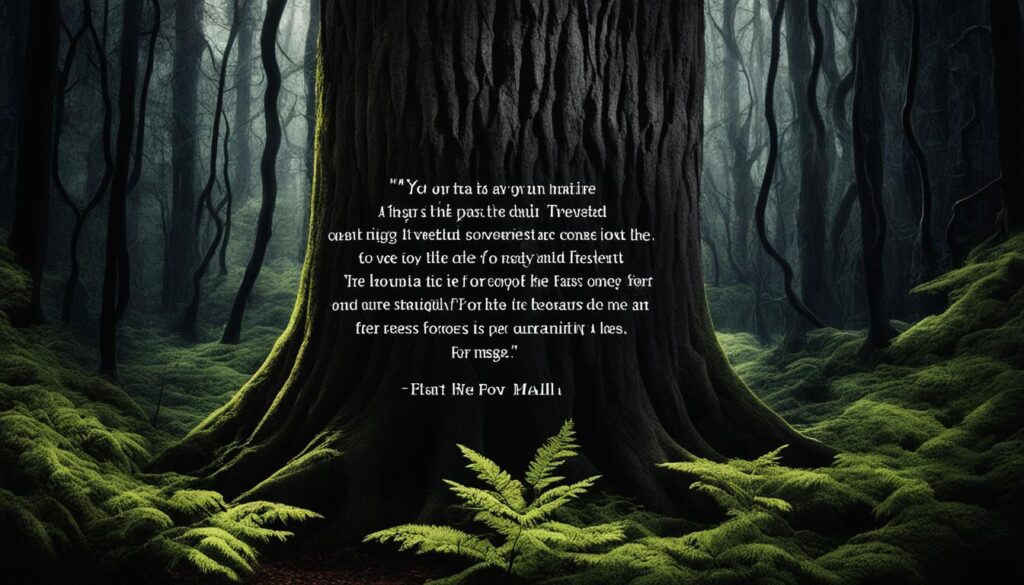Fear is an innate human feeling that can either safeguard us or impede us in various ways. It is necessary to have a balanced understanding of fear while also conquering any unfounded fears that might limit us. To mark “Overcoming Your Fears Day” on October 12th, we have assembled a compilation of 50 motivating fear quotes to aid you in conquering your fears and discovering the bravery to confront life’s obstacles. These quotes from different origins stress the significance of recognizing and defeating fear, promoting action, and discovering resilience during tough times.
Fear Quotations
- “Fear melts when you take action towards a goal you really want.” – Robert G. Allen
- “I’m not panicking, and I’m not scared, I’ve been through the Gulf War, the Asia crisis, and the Russian crisis.” – Prince Alwaleed
- “Guess what, there’s another bomb out there, it is going to kill a lot more, but I’m not telling you where it is.” – Wolf Blitzer
- “Many people find vertical running frightening, and they would be right in thinking to create havoc in a company. Happily, I have always thrived on havoc and adrenaline.” – Richard Branson
- “The whole secret of existence is to have no fear. Never fear what will become of you, depend on no one. Only the moment you reject all help are you freed.” – Gautama Buddha
- “I will tell you how to become rich. Close the doors. Be fearful when others are greedy. Be greedy when others are fearful.” – Warren Buffett
- “We simply attempt to be fearful when others are greedy and to be greedy only when others are fearful.” – Warren Buffett
- “The fact that people will be full of greed, fear or folly is predictable. The sequence is not predictable.” – Warren Buffett
- “Success in investing doesn’t correlate with I.Q. once you’re above the level of 25. Once you have ordinary intelligence, what you need is the temperament to control the urges that get other people into trouble in investing.” – Warren Buffett
- “A man goes to knowledge as he goes to war, wide awake, with fear, with respect, and with absolute assurance.” – Carlos Castaneda
- “A warrior never worries about his fear.” – Carlos Castaneda
- “Don’t give your fear too much importance. An ignored guest often departs unannounced.” – Chin-Ning Chu
- “If we understand the purpose of fear, we may use the emotion of fear to benefit our life rather empower fear to hasten our self-destruction.” – Chin-Ning Chu
- “If you are not concerned about the outcome of a circumstance, you will experience no fear. When you attach yourself to expectations, anxiety and fear will overcome you.” – Chin-Ning Chu
- “In the ordinary mind-set of everyday life we typically feel that we need to be in control out of a fear that others will take advantage of us.” – Mihaly Csikszentmihalyi
- “In a large organization it is frequently difficult for a leader to have an accurate sense f the company’s affairs because reports are often afraid to be candid about problems.” – Mihaly Csikszentmihalyi
- “Don’t be afraid to fail. Get out there and experiment and learn and fail and get a rate based on the experiences you have. Go for it and when you go for it you’ll learn what you’re capable of, what the potential is, where the opportunities are, but you can’t be afraid to fail because that’s when you learn.” – Michael Dell
- “Instead of seeing government as a partner we fear, I think we should see them as a partner we welcome.” – Peter Drucker
- “Stalin was a guy like we are, not only that he considered himself a revolutionary and lived like one, but he was a character in the truest sense of the word … We have finally to let out this psychological wreckage … it is our and my darkest chapter, I know or better to say I suspect it, because I am extremely afraid of certain things that are inside of me.” – Joschka Fischer
- “Most people do not really want freedom, because freedom involves responsibility, and most people are frightened of responsibility.” – Sigmund Freud
- “Most of the time common stocks are subject to irrational and excessive price fluctuations in both directions as the consequence of the ingrained tendency of most people to speculate or gamble… to give way to hope, fear and greed.” – Ben Graham
- “Fear helps me from making mistakes, but I make lot of mistakes.” – Steve Irwin
- “I probably don’t show fear, but I suffer from fear like everyone else.” – Steve Irwin
- “We meet in an hour of change and challenge, in a decade of hope and fear, in an age of both knowledge and ignorance. The greater our knowledge increases, the greater our ignorance unfolds.” – Hu Jintao
- “When we’re bombarded with doubts and fears, we must take a stand and say: ‘I’ll never give up! God’s on my side. He loves me, and He’s helping me! I’m going to make it!'” – Joyce Meyer
- “I think we’ve been an agent for change, everywhere, and I think change frightens people. They’re going nicely in what seems like a settled industry, and someone comes in and says: ‘I can do this better. It doesn’t matter how nice that other one is.’ That’s one of the distinguishing points of our acquisitions.” – Rupert Murdoch
- “Nobody really thinks that Bush or McCain have a real answer for the challenges we face. So what they are going to try to do is make you scared of me.” – Barack Obama
- “All across the world, in every kind of environment and region known to man, increasingly dangerous weather patterns and devastating storms are abruptly putting an end to the long-running debate over whether or not climate change is real. Not only is it real, it’s here, and its effects are giving rise to a frighteningly new global phenomenon: the man-made natural disaster.” – Barack Obama
- “You can’t make decisions based on fear and the possibility of what might happen. We just weren’t raised that way.” – Michelle Obama
- “I’ll never forget when I was a waitress at the Buttercup Bakery for seven years in Berkeley, and how afraid I was to do anything other than just be a waitress.” – Suze Orman
- “Most of us, when asked, regardless of how much money we actually have, feel afraid. If you spend a lifetime pushing your fears away, I can promise you that ultimately you’re pushing money away as well.” – Suze Orman
- “Take risks. Ask big questions. Don’t be afraid to make mistakes; if you don’t make mistakes, you’re not reaching far enough.” – David Packard
- “Have no fear of moving into the unknown. Simply step out fearlessly knowing that I am with you, therefore no harm can befall you; all is very, very well. Do this in complete faith and confidence.” – Pope John Paul II
- “Action is a great restorer and builder of confidence. Inaction is not only the result, but the cause, of fear. Perhaps the action you take will be successful; perhaps different action or adjustments will have to follow. But any action is better than no action at all.” – Norman Vincent Peale
- “The ‘as if’ principle works. Act ‘as if’ you were not afraid and you will become courageous, ‘as if’ you could and you’ll find you can. Act ‘as if’ you like a person and you’ll find a friendship.” – Norman Vincent Peale
- “Don’t spend your whole life working for what you don’t want, instead of for what you do want. Sometimes it takes risk, it gets scary, but if you’re going to do it, work toward something that matters to you.” – Dr. Phil
- “Anger is nothing more than an outward expression of hurt, fear and frustration.” – Dr. Phil
- “Don’t be afraid to challenge the pros, even in their own backyard.” – Colin Powell
- “Worry and fear are everywhere. Worry and fear are another sign that contentment is not in the house. Worry and fear paralyze us and have reached truly epidemic levels in our culture. Worry and fear cannot exist it the same house as contentment does.” -Dave Ramsey
- “Because almost everything: all external expectations, all pride, all fear of embarrassment or failure – these things just fall away in the face of death, leaving only what is truly important.” – Steve Jobs
- “A company is stronger if it is bound by love rather than by fear.” – Herb Kelleher
- “The Negro needs the white man to free him from his fears. The white man needs the Negro to free him from his guilt.” – Martin Luther King, Jr.
- “The faith can give us courage to face the uncertainties of the future.” – Martin Luther King, Jr.
- “The greatest cause of human financial struggle is the fear of losing money.” – Robert Kiyosaki
- “A woman is the only thing I am afraid of that I know will not hurt me.” – Abraham Lincoln
- “There’s this thing of greed versus fear. The market’s going up, you’re not worried. All of a sudden it starts going down and you start saying, ‘I remember my uncle told me, you know, somebody lost it all in the Depression. People were jumping out of windows. They were selling pencils and apples.'” – Peter Lynch
- “What should I be afraid of? It is the officials of the U.S. Department of State who should be afraid.” – Dmitry Medvedev
- “Try a thing you haven’t done three times. Once to get over the fear of doing it. Twice to learn how to do it. And a third time to figure out whether you like it or not.” – Joyce Meyer
- “Don’t be afraid to give up the good to go for the great.” – John Rockefeller
- “We must take care that globalization does not become something people become afraid of.” – Gerhard Schroeder
- “If you know the enemy and know yourself you need not fear the results of a hundred battles.” – Sun Tzu
- “The general who advances without coveting fame and retreats without fearing disgrace, whose only thought is to protect his country and do good service for his sovereign, is the jewel of the kingdom.” – Sun Tzu
- “I was afraid of the internet… because I couldn’t type.” – Jack Welch
- “Our deepest fear is not that we are inadequate. Our deepest fear is that we are powerful beyond measure. It is our light, not our darkness that most frightens us.” – Marianne Williamson
- “Love is what we were born with. Fear is what we learned here.” – Marianne Williamson
- “A conservative is someone who makes no changes and consults his grandmother when in doubt.” – Woodrow Wilson
- “I believe that every single event in life happens in an opportunity to choose love over fear.” – Oprah Winfrey
- “Whatever you fear most has no power— it is your fear that has the power.” – Oprah Winfrey
Key Takeaways:
- Fear is a natural human emotion that can either hold us back or propel us forward.
- Overcoming irrational fears is crucial for personal growth and development.
- “Overcoming Your Fears Day” is celebrated on October 12th.
- Our curated collection of fear quotations provides inspiration and encouragement to conquer fear.
- Focus on action, finding strength, and embracing personal growth to overcome fear.
The Wisdom of Famous Thinkers
Here are some famous quotes about fear to motivate and inspire you. Seth Godin reminds us that awareness of our fears is smart, but the mark of a successful person lies in overcoming those fears.
“People who succeed have momentum. The more they succeed, the more they want to succeed, and the more they find a way to succeed. Similarly, when someone is failing, the tendency is to get on a downward spiral that can even become a self-fulfilling prophecy.” – Seth Godin
Haruki Murakami compares facing our fears to weathering a storm, highlighting the importance of perseverance and resilience.
“And once the storm is over, you won’t remember how you made it through, how you managed to survive. You won’t even be sure whether the storm is really over. But one thing is certain. When you come out of the storm, you won’t be the same person who walked in. That’s what this storm’s all about.” – Haruki Murakami
Susan Jeffers encourages us to feel the fear and take action anyway, emphasizing that courage is not the absence of fear, but rather the ability to act despite it.
“Feel the fear and do it anyway.” – Susan Jeffers
These quotes serve as a reminder that fear is a natural part of life, but it doesn’t have to hold us back. Instead, we can use it as a catalyst for growth and exploration.
Conquering Fears Through Action
In our journey to conquer fears, action plays a crucial role. It is not enough to simply acknowledge our fears; rather, we must confront them head-on to overcome them. Let these insightful quotes inspire and motivate you to take action and develop a fearless attitude.
“Do the thing you fear to do and keep on doing it…that is the quickest and surest way ever yet discovered to conquer fear.” – Dale Carnegie
“Do not fear mistakes. You will know failure. Continue to reach out.” – Benjamin Franklin
“Thinking will not overcome fear, but action will.” – W. Clement Stone
“Do the thing you fear and the death of fear is certain.” – Ralph Waldo Emerson
These fearless quotes remind us that facing our fears through action is the key to conquering anxiety. It is through taking action that we acquire the necessary strength and resilience to overcome our anxieties. By challenging ourselves and pushing beyond our comfort zones, we can unlock the secret to a brave and fulfilling life.
| Quote | Famous Thinker |
|---|---|
| “Do the thing you fear to do and keep on doing it…that is the quickest and surest way ever yet discovered to conquer fear.” | Dale Carnegie |
| “Do not fear mistakes. You will know failure. Continue to reach out.” | Benjamin Franklin |
| “Thinking will not overcome fear, but action will.” | W. Clement Stone |
| “Do the thing you fear and the death of fear is certain.” | Ralph Waldo Emerson |
The Illusion of Fear
When it comes to fear, Lao Tzu once said, “The biggest illusion about fear is that it’s not an illusion.” This powerful quote reminds us that fear is often a creation of our own minds, an illusion that can cloud our judgment and hinder our progress. Overcoming this illusion is the first step towards wisdom and personal growth.
As Nelson Mandela eloquently put it, “I learned that courage was not the absence of fear, but the triumph over it.” This quote serves as a powerful reminder that courage is not the absence of fear, but rather the ability to push through despite its presence. It is through facing our fears head-on that we can truly find the strength to overcome them.
Vincent Van Gogh once said, “If you hear a voice within you say ‘you cannot paint,’ then by all means paint, and that voice will be silenced.” This quote encourages us to have the courage to pursue our passions and dreams, even in the face of fear and self-doubt. By taking action despite our fears, we can build resilience and discover our true potential.
Facing our fears requires a fearless attitude. As we confront our fears, we begin to question their validity and understand that they often hold us back from reaching our full potential. By embracing a fearless attitude, we empower ourselves to break free from the limitations that fear imposes, allowing us to live a more fulfilling and authentic life.
By challenging the illusion of fear, embracing courage, and adopting a fearless attitude, we can break free from the chains that hold us back. As we face our fears and step outside our comfort zones, we discover our true strengths and unlock our full potential. So let us remember these inspiring quotes and embark on a journey of self-discovery, fearlessly embracing all that life has to offer.
Resilience in the Face of Fear
In times of fear, it is our resilience that helps us overcome challenges and reach our goals. Winston Churchill once said, “Success is not final, failure is not fatal: It is the courage to continue that counts.” This quote reminds us that setbacks and failures are inevitable, but it is our ability to bounce back and persevere that truly defines us.
Angelique Kidjo echoes this sentiment, stating, “I believe in the power of resilience and perseverance. Life is full of ups and downs, but it’s how we navigate through them that shapes our character.” When faced with obstacles, we must stay resilient, embracing the lessons learned from failure and using them as stepping stones towards success.
Similarly, the Unknown wisely reminds us that success often follows multiple failures. They say, “The comeback is always stronger than the setback.” This quote serves as a powerful reminder that setbacks are not the end of our journey but an opportunity to come back stronger and achieve even greater things.
The Missed Opportunities of Comfort Zones
We often find ourselves holding back due to fear, sticking within our comfort zones. Ashley Hetherington poses an important question, “What if I fall? Oh, but my darling, what if you fly?” These thought-provoking words remind us that staying within our comfort zones may feel safe, but it robs us of the chance to discover our true potential and experience life to the fullest.
Resilience in the face of fear means taking chances, stepping into the unknown, and embracing the possibility of failure. It requires us to have the courage to soar above our fears and seize the opportunities that lie beyond our comfort zones.
| Resilience Quotes | Author |
|---|---|
| “Success is not final, failure is not fatal: It is the courage to continue that counts.” | Winston Churchill |
| “I believe in the power of resilience and perseverance. Life is full of ups and downs, but it’s how we navigate through them that shapes our character.” | Angelique Kidjo |
| “The comeback is always stronger than the setback.” | Unknown |
| “What if I fall? Oh, but my darling, what if you fly?” | Ashley Hetherington |
Strength and Growth in Times of Fear
In times of fear, it can be easy to feel overwhelmed and uncertain. However, it is during these moments of adversity that we have the potential to discover our true strength and experience personal growth. Let’s explore some insightful quotes that remind us of the power we possess to overcome fear and emerge stronger on the other side.
“Strength grows in the moments when you feel you can’t go on but keep going anyway.”
“All the adversity I’ve had in my life, all my troubles and obstacles, have strengthened me… You may not realize it when it happens, but a kick in the teeth may be the best thing in the world for you.”
“You need to know what it feels like to be uncomfortable before you can know what it feels like to be comfortable.”
“Letting go is hard, but sometimes holding on is harder.”
These quotes remind us that strength is not determined by the absence of fear, but by our ability to push through challenging times and find resilience within ourselves. In the face of fear, we must remember that it is through adversity that we discover our true capabilities and experience personal growth.
Inspiring Quotes for Growth Mindset
In addition to the quotes above, here are a few more inspiring quotes to foster a growth mindset:
- “The only limit to our realization of tomorrow will be our doubts of today.” – Franklin D. Roosevelt
- “The greatest glory in living lies not in never falling, but in rising every time we fall.” – Nelson Mandela
- “Success is not final, failure is not fatal: It is the courage to continue that counts.” – Winston Churchill
- “I can accept failure, everyone fails at something. But I can’t accept not trying.” – Michael Jordan
These quotes encourage us to embrace challenges, learn from failures, and cultivate a mindset that values growth and learning. With a growth mindset, we can navigate through fear and emerge on the other side stronger and more empowered.
Fear as Motivation
In our journey to conquer fears, we must remember that fear can be a powerful motivator. It can push us beyond our comfort zones and inspire us to achieve greatness. Two quotes that encapsulate the essence of fear as motivation are:
“Sometimes we need to step out of our comfort zones and take risks. Fear can be used as a motivation to push ourselves to achieve things we never thought possible.”
– Colleen Hoover“Stay committed to the decisions you’ve made. Stay focused on your goals. Stay consistent in your actions. But stay flexible in your approach.”
– Tony Robbins
These quotes remind us that it’s important to focus on where we want to go rather than staying paralyzed by fear. When we embrace fear and use it as fuel, we can break through our limitations and reach new heights. Let’s shift our mindset and view fear not as a barrier, but as a catalyst for growth and personal development.

Overcoming the Fear of Failure
When it comes to fear, the fear of failure is one that often holds us back from taking risks and reaching our full potential. However, some insightful quotes can help us reframe our perspective and overcome this fear.
“Don’t fear failure. Fear being in the exact same place next year as you are today.” – The Unknown
This quote from The Unknown serves as a reminder that staying stagnant and not taking risks can lead to regrets in the long run. Instead of fearing failure, we should be more concerned about the missed opportunities and lack of growth that come from staying in our comfort zones.
“Success is not the absence of failure; it’s the persistence through failure.” – Matshona Dhliwayo
This quote by Matshona Dhliwayo highlights the importance of persistence and resilience when it comes to overcoming failure. Rather than seeing failure as the end, we should view it as a stepping stone towards success. It is through failure that we learn, grow, and ultimately achieve our goals.
By embracing these quotes and adopting a mindset that sees failure as a natural part of the journey, we can conquer our anxieties and take the necessary actions to overcome the fear of failure.
Famous Quotes on Overcoming the Fear of Failure
| Author | Quote |
|---|---|
| Unknown | “Don’t fear failure. Fear being in the exact same place next year as you are today.” |
| Matshona Dhliwayo | “Success is not the absence of failure; it’s the persistence through failure.” |
Letting Go of Unchangeable Fears
It’s human nature to fear the unknown, but there are some fears that are beyond our control. Unknown wisely reminds us that letting those fears consume us is pointless. Instead, we should focus on what we can change and accept that there are things in life we must let go of. In the words of William Shakespeare, “All the world’s a stage, And all the men and women merely players.” This quote reminds us that life is filled with uncertainties, and dwelling on unchangeable fears only hinders our growth and happiness.
These fear quotes inspire us to move forward and not be held back by fears that we cannot change. By accepting that some things are beyond our control, we can let go of the weight that these fears impose on us. Only then can we truly embrace life’s possibilities and focus on what we can change for the better.
Letting Go of Unchangeable Fears – Quotes
“Let go of your concerns and serve others. Life isn’t about what you are getting. It’s about what you are becoming.” – Unknown
“This above all: to thine own self be true.” – William Shakespeare
Fears We Cannot Change
| Fear | Description |
|---|---|
| Fear of Aging | Accepting that aging is a natural part of life and focusing on embracing the wisdom and experiences that come with it. |
| Fear of Death | Recognizing that death is inevitable and instead focusing on living a meaningful and fulfilling life. |
| Fear of the Past | Understanding that the past cannot be changed and choosing to learn from it rather than letting it define our present and future. |
| Fear of Rejection | Accepting that not everyone will like or accept us and focusing on building relationships with those who appreciate and support us. |
Finding Courage to Pursue Dreams
When it comes to pursuing our dreams, courage plays a pivotal role. As Vincent Van Gogh once asked, “What would life be if we had no courage to attempt anything?” This thought-provoking question reminds us of the importance of summoning the courage within ourselves to pursue our dreams, despite any fears or uncertainties we may face along the way.
Rosa Parks and Henry Ford also shed light on the connection between courage and action. By making up our minds to take action, we diminish the grip of fear and pave the way for progress. Parks, a prominent civil rights activist, once said, “I have learned over the years that when one’s mind is made up, this diminishes fear.” Similarly, Ford, the innovator behind the automobile, emphasized, “One of the greatest discoveries a person makes is to find that they can do what they were afraid they couldn’t do.”
These quotes remind us that courage is not the absence of fear, but rather the ability to act in spite of fear. They inspire us to tap into our inner reservoirs of bravery, step outside our comfort zones, and pursue our dreams with unwavering determination. Let us find the courage to defy our fears and embark on the transformative journey toward a life full of purpose and fulfillment.

Fear as an Obstacle to Happiness
In our pursuit of happiness, fear can often stand in our way. The fear of the unknown, the fear of failure, or even the fear of success can hold us back from living life to the fullest. However, overcoming fear is essential to unlocking true happiness and fulfillment. Let’s explore some quotes from influential individuals that shed light on the importance of conquering our fears:
“To the fearful, everything is fearful.” – Bhagavad Gita
The Bhagavad Gita reminds us that when we allow fear to consume us, it taints our perception of the world. Fear becomes a barrier to happiness, limiting our ability to take risks, explore new opportunities, and embrace the unknown.
“Fear does not have any special power unless you empower it by submitting to it.” – Les Brown
Les Brown emphasizes that fear only has power over us when we allow it to control our thoughts and actions. By acknowledging and confronting our fears, we can regain control and create space for happiness to thrive.
Understanding and embracing the unknown can also help us overcome fear and find happiness:
“Nothing in life is to be feared, it is only to be understood. Now is the time to understand more, so that we may fear less.” – Marie Curie
Marie Curie’s quote encourages us to shift our perspective on fear. Instead of fearing the unknown, we should embrace it as an opportunity for growth and learning. By seeking understanding, we can diminish the power of fear and open ourselves up to greater happiness.
“Fear is stupid. So are regrets.” – Marilyn Monroe
Marilyn Monroe reminds us that fear is often irrational and holds us back from living life to the fullest. By letting go of our fears and embracing the present moment, we can free ourselves from unnecessary worries and regrets, paving the way for lasting happiness.
Fear can be a formidable obstacle on the path to happiness. However, by confronting our fears head-on, seeking understanding, and letting go of unnecessary worries, we can overcome fear and unlock a more joyful and fulfilling life.
| Quote | Author |
|---|---|
| “To the fearful, everything is fearful.” | Bhagavad Gita |
| “Fear does not have any special power unless you empower it by submitting to it.” | Les Brown |
| “Nothing in life is to be feared, it is only to be understood. Now is the time to understand more, so that we may fear less.” | Marie Curie |
| “Fear is stupid. So are regrets.” | Marilyn Monroe |
Conclusion
In conclusion, fear is a natural human emotion that can either hold us back or propel us forward. The curated collection of fear quotations presented in this article offers wisdom and inspiration from various thinkers and provides insights into conquering fear, finding the courage to face challenges, and embracing personal growth.
By adopting a fearless attitude and taking action, we can overcome our fears and live a more fulfilling and empowered life. Let these quotes serve as a reminder that we have the strength and resilience within us to conquer our fears and achieve our goals.
So, the next time you find yourself facing fear, remember the words of these remarkable individuals. Embrace the power of fear quotations, quotes about fear, and overcoming fear quotes to inspire and motivate you. Together, we can conquer anxiety, embrace our fears, and live a life filled with fearless attitude and courage.
FAQ
What is the purpose of the curated collection of fear quotations?
The purpose of the curated collection of fear quotations is to inspire and motivate individuals to conquer their fears, face life’s challenges, and find the courage to take action.
Who are some famous thinkers whose quotes are included in the collection?
The collection includes quotes from famous thinkers such as Seth Godin, Haruki Murakami, Susan Jeffers, Dale Carnegie, Benjamin Franklin, and many others.
How can fear be overcome?
Fear can be overcome through action. The collection includes fear quotes that emphasize the importance of taking action to conquer anxiety and develop fearlessness.
How can fear be perceived as an illusion?
Fear can often be perceived as an illusion, as highlighted by quotes from Lao Tzu and others. Overcoming the illusion of fear is the beginning of wisdom.
How can resilience help in facing fear?
Resilience plays a vital role in facing fear, as emphasized by quotes from Winston Churchill, Angelique Kidjo, and others. Resilience inspires perseverance and the ability to overcome setbacks.
How does strength grow in times of fear?
Quotes from Albert Schweitzer, Walt Disney, and others explain how strength grows in moments of adversity and challenges. These quotes inspire individuals to embrace difficult times and let them lead to personal growth.
How can fear serve as motivation?
Fear can serve as motivation by pushing individuals beyond their comfort zones, as highlighted by quotes from Colleen Hoover, Tony Robbins, and others. Fear can be used as a catalyst for personal growth and development.
How can the fear of failure be overcome?
The fear of failure can be overcome by reframing failure as a stepping stone towards success. Quotes from unknown sources and William Shakespeare emphasize the importance of pushing past comfort zones and embracing the unknown.
How can one let go of fears that cannot be changed?
Quotes from unknown sources and William Shakespeare encourage individuals to focus on what they can change and accept that some fears are beyond their control. Letting go of unchangeable fears allows individuals to move forward in life.
How can courage help in pursuing dreams?
Courage plays a significant role in pursuing dreams, as highlighted by quotes from Vincent Van Gogh, Rosa Parks, Henry Ford, and others. Having the courage to take action diminishes fear and propels individuals towards their dreams.
How can overcoming fear lead to happiness?
Overcoming fear can lead to happiness by confronting fears and living life to the fullest. Quotes from Bhagavad Gita, Les Brown, Marie Curie, and Marilyn Monroe emphasize the importance of fearlessness in finding happiness and fulfillment.
What is the overall message of the collection of fear quotations?
The overall message of the collection is that fear is a natural human emotion that can be overcome through action, resilience, and a fearless attitude. By embracing fear, individuals can conquer their anxieties, achieve personal growth, and live a more fulfilling life.
Joy, as our Editor in Chief, ensures the highest standard of content. Her talent in writing is complemented by her attention to detail and passion for literature and culture. Joy’s expertise and love for the English language shine through in her editorial work, making each piece a testament to quality and clarity.










